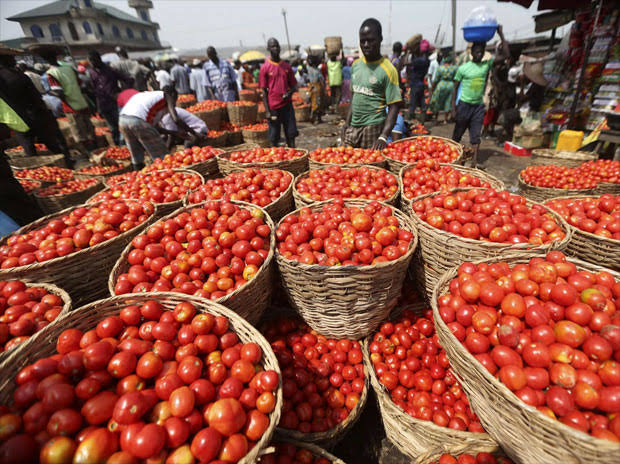Born to a farming family, Liza Kengran witnessed first-hand the waste that tomato farmers endure during harvest season when crops mature quickly. So she came up with a solution.
This story was contributed to TechCabal by Njodzeka Danhatu/bird story agency.
Kengran Liza Vernyuy fondly recollects her grandfather’s tomato farm in Ntonghi, in the Bui Division of Cameroon’s Northwestern Region.
Growing up in a tomato growing community, she remembers vividly the excitement of thousands of brightly coloured tomatoes in every garden around her during harvest time – and then the desperation of farmers to sell off as much of their produce as they could, eventually at giveaway prices, as the bright colours began to be replaced by spoilt fruit and a rotting stench.
As a 22-year-old she witnessed the pain and despair of thousands of farmers and villagers, including her mother, dumping the rotting tomatoes because of their short shelf life if not consumed or sold quickly.
She noticed how, during harvesting season – which is just a few days for many small-scale farmers, depending on the size of the land available – farmers would carefully select near-ripe tomatoes, load them into baskets and get them quickly to market. However, owing to the poor road network and the lack of any preservation means, many tomatoes would arrive at the market in a bad state – resulting in low returns for the farmer.
This problem is referred to as post-harvest loss and is one of the biggest causes of food insecurity in some parts of Africa.
In August 2020, Cameroonian tomato farmers in Yaounde saw considerable losses during the coronavirus pandemic, which made it difficult for farmers to transport their produce to neighbouring towns and outside the country.
By this time, Vernyuy was at university. Choosing to study agricultural engineering, she was determined to find a solution to the pain and suffering she saw each year at harvest time. She needed a solution that would allow farmers like her grandparents to preserve their foodstuffs for long periods.
“I chose to pursue science, technology, engineering, and mathematics (STEM) right from high school to give a grounding for my future innovation,” said Vernyuy.
And then she found it – a tomato dehydrator, a solution Vernyuy knew would help to lessen the losses tomato farmers suffer due to rotting.
“I was always intrigued by machinery from my childhood, and I wanted to engage in anything mechanical,” Vernyuy explained.
A tomato dehydrator is a preservation machine used in many places worldwide. It uses the principle of air-drying the fruit, removing all residual water.
“I had the idea of dehydration and dry preservation, so I started my research on post-harvest losses in fruits and vegetables and how that can be managed by dehydration,” she said.
Coming from the tomato region, she had a good idea about the practical requirements needed to solve the problem.
Her machine is made of iron, aluminum, insulating material, a thermostat, and fans. It is essentially a welded frame and trays, with insulating material to maintain temperature and the electric components all safely aligned and tucked away. It then gets its finishing touches.
“The machine contains 12 trays having a height of 1 metre and 72 centimetres in width,” Vernyuy explained.
Creating her prototype tomato dehydrator was not easy. It required time and patience, and needed to be reworked five times before she was happy.
“I did a lot of research; I did not get it right the first time,” Vernyuy said.
“Since producing the first one, I have made improvements; now it looks like a small refrigerator,” she added.
It also required a lot of money, which Vernyuy did not have as a student. But thanks to her mother, who gave her FCFA 260,000 (435 US dollars) from her savings, she was able to make the first machine during a three-month internship between June and March 2021, in Yaounde.
Today Vernyuy’s tomato dehydrators are available on the market in Yaounde, Douala, and Ngoundere and cost on average FCFA 280,000 ($468) each. They come in different sizes, depending on how much produce the user has.
Although the dehydrator was created with the tomato farmers in mind, it can be used for all fruits and vegetables.
Regina Tabe Bate, the proprietor of the Douala-based Yoga and Beverages company, was one of Vernyuy’s first customers. The businesswoman uses the tomato dehydrator to dry ginger and lemon in order to make a tea infusion which she packages and sells.
“Before I got the electric dehydrator, I used a traditional oven to dry my ginger, but it would burn, and change colour; It would not be as hot as I wanted,” Bate said.
“When I use [the tomato dehydrator] to dry my ginger, it maintains the color, texture, nutrients, and everything; it remains the same. It is actually really good,” she added.
Vernyuy is now on the third iteration of her dehydrator and is pursuing a Master’s degree in Agricultural and environmental engineering at the University of Bamenda.
She is also raising capital to create a start-up company to enable her to produce her machines in greater quantities. Through the endeavour she hopes to create employment opportunities for other young people, especially those in agricultural engineering.
She also has her eye on opening a shop to sell dry fruits and vegetables at affordable prices.
She believes that Africa has what it takes to tackle its man challenges but that to make the continent great, the youth have to rise to the occasion.
“I feel happy as my project has greatly inspired and motivated my juniors and peers to think out of the box,” Vernyuy said.
If you enjoyed reading this article, please share it in your WhatsApp groups and Telegram channels.





















